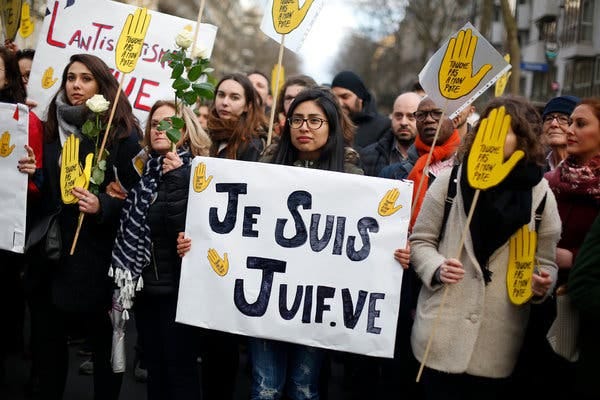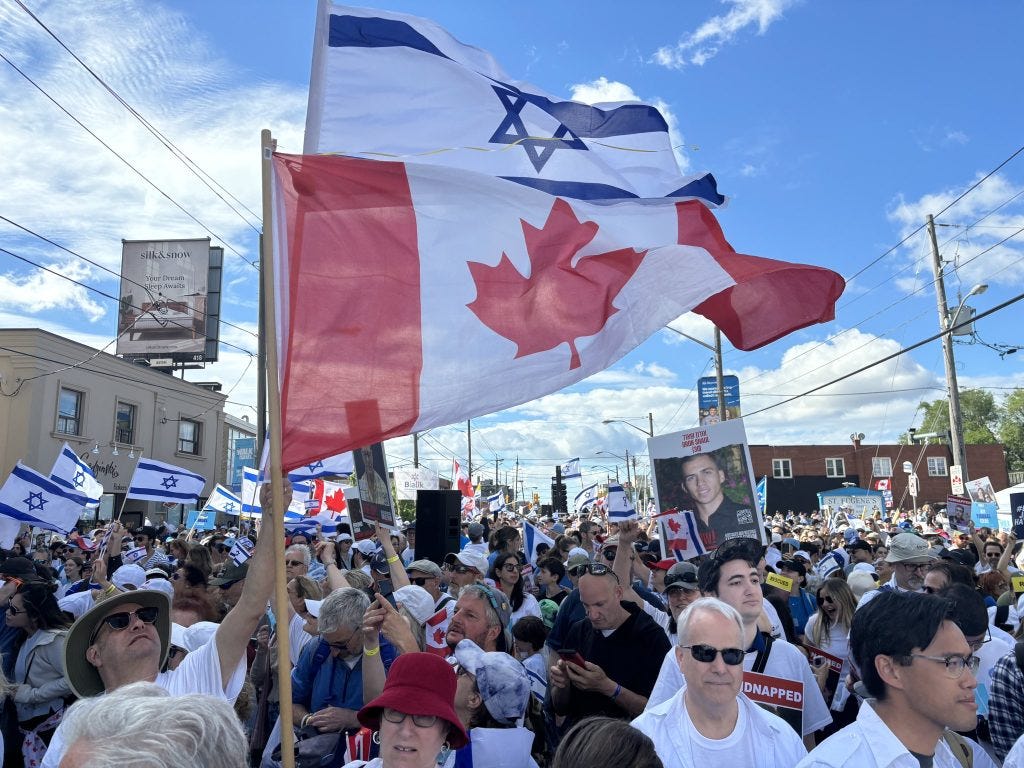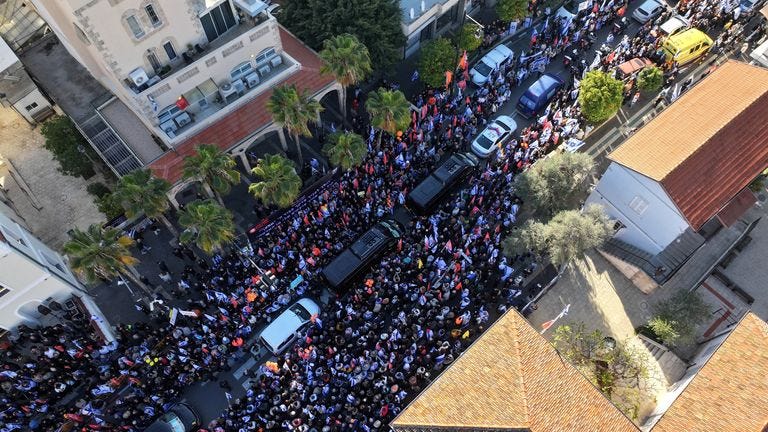This is a guest post from Ariel Rodal-Spieler, originally from Ottawa, who made aliya 25 years ago. She is a translator, writer, and member of the World Jewish Congress Jewish Diplomatic Corps.
It’s been a rough week.
The mood in Israel right now feels eerily reminiscent of the days immediately following October 7 — minus the shock, but with all the grief. Perhaps the last time the country felt this heavy was on September 1, 2024, when we learned that six Israeli hostages — Hersh Goldberg-Polin, Eden Yerushalmi, Ori Danino, Alexander Lobanov, Carmel Gat, and Almog Sarusi — who had survived months in captivity, were brutally executed by their Hamas captors. Or on December 15, 2023, when the devastating news broke that three Israeli hostages — Yotam Haim, Alon Shamriz, and Samer Talalka — were mistakenly killed by IDF soldiers.
In the past week, we received the long-dreaded news we didn’t want to believe until we had no other choice — the confirmation of the murder of Shiri Bibas and her two young, beautiful sons, Ariel and Kfir. Their funerals were held on Wednesday, with thousands of Israelis lining the streets to accompany the funeral procession in a powerful display of solidarity. We also endured more Hamas psychological warfare in the form of their sending Israel an unidentified body instead of Shiri’s, and staging another grotesque release ceremony, this time forcing two hostages — Evyatar David and Guy Gilboa-Dalal —to witness the process without being freed themselves. And then there was the attempted mass terrorist attack — miraculously avoided — in which multiple buses in central Israel exploded in what could have been one of the deadliest coordinated attacks in years.
I wouldn’t say it’s easy to live here.
But I don’t regret my choice to move here from Canada 25 years ago for a second.
I didn’t come to Israel for an easy life. In fact, a year after I made aliyah, the Second Intifada broke out — a period that, until October 7, I had always thought of as Israel’s darkest time. I lost a soldier from my unit in the Battle of Jenin during Operation Defensive Shield in 2002. I was here through the Second Lebanon War in 2006 and all the previous “rounds” with Hamas in Gaza. Israel’s history has been defined by an unrelenting cycle of terror and resilience. It has always fought for its right to exist.
October 7 and the war that followed were obviously unprecedented in myriad ways, not least in scale and a level of brutality unlike anything we’d seen before. But it wasn’t as if I was living under any illusions that our neighbours don’t want us dead. The biggest shock of October 7 was the failure of our government to protect us and take responsibility. But even that, given the priorities of this current coalition, was sadly unsurprising.
So no, I didn’t come here because I thought it would be “safe.” But ironically, I have always felt safer here than anywhere else in the world. And not just physically — I feel free here. I feel at home in a way that I never did, or could, in Canada.
Israel is the only place where Jews can live freely as a majority and take control of their own destiny. That was part of my decision to make aliyah— to build a life in a country where being Jewish wasn’t an identity to be explained or defended, but simply lived.
And, to be honest, as a 20-year-old “olah”, the weather, nightlife, and fantastic beaches didn’t hurt. As I’ve gotten older, I’ve come to appreciate some more important perks — including, perhaps surprisingly, how safe it feels. I feel comfortable as a woman walking alone at night, my kids walk to the park on their own to play soccer, even after dark (“stranger danger” isn’t really a thing here), and the healthcare system is fantastic.

Israel is not perfect. There are deep political and ideological divisions. The fractures in our society were impossible to ignore in the year before October 7. But despite everything, something unshakable holds us together. The feeling that we are family. That when things get hard, when tragedy strikes, we show up for each other. And that is something I have never seen replicated anywhere else in the world.
Israel or the Diaspora: Where are Jews more at risk?
The October 7 massacre and its aftermath exposed the vulnerability of Israeli life. We are a nation at war, living under constant threat, with no clear end in sight. Meanwhile, Jews in places like Canada don’t have to worry about rocket sirens or sending their kids to war. Their lives, on the surface, seem safer, calmer, more predictable.
But if anyone thought the answer was to move or remain in the Diaspora, they quickly learned that there is no truly safe place for Jews anymore. The explosion of antisemitism after October 7 — the attacks, the protests, the open threats — has shaken Diaspora Jews to their core. The same people who may have viewed Israel as dangerous now hesitate to wear a Magen David in Montreal or walk into a kosher restaurant in Paris. The silence from those we thought to be our allies and the justifications for terrorism are not passing trends, but fundamental shifts.
The global antisemitic backlash should not have been surprising — not to anyone paying attention. The demonization of Israel, the double standards, and the willingness to excuse terrorism in the name of “resistance” have been decades in the making. The only difference now is that these forces are no longer confined to academic discourse and radical fringes — they have moved into the mainstream.
In countries where Jews had long felt secure, integrated, at home, they are now questioning whether they truly belong. If their friendships, their social standing, their place in society were ever as solid as they believed. If the institutions they trusted — their schools, their workplaces, their governments — will still stand by them when it matters most.
October 7 was not just an attack on Israel. It was a test for the entire world. And in the months that followed, many Diaspora Jews found themselves feeling abandoned, isolated, and deeply disillusioned.
So, what is the greater danger: the immediate risks of war in Israel, or the increasing alienation and insecurity facing Jews in the Diaspora?
There’s no easy answer. If safety is measured in raw numbers, maybe it is more dangerous to be a Jew in Israel than in, say, Canada. But if safety also includes a sense of belonging and the ability to live openly and proudly as a Jew without fear, then Israel remains unmatched.
No one in Toronto is running to bomb shelters. But danger isn’t just about rockets and war. It’s about whether a community can survive in the long run. It’s about whether Jews can continue to live fully and freely as Jews in the places they call home.
And history tells us that when Jews begin to feel unsafe in the Diaspora, it is often the beginning of something far worse.
The irony is that for years, the conversation around aliyah was framed as a choice between comfort and sacrifice. Jews in the Diaspora were seen as the ones choosing ease and convenience, while those in Israel had chosen purpose and meaning. But that equation no longer holds. Today, Jews in Canada and across the West are having to fight — to justify their identity, to stand up to hatred in spaces that once felt welcoming. They are being asked to be brave in ways they never imagined.
The answer I keep coming back to
This is not to say that aliyah is the only path forward. The strength of Jewish communities abroad is vital. But personally, I cannot imagine living anywhere else.
I’d rather live in a country where my fight is for survival, not for legitimacy. I’d rather face an enemy that is outside my walls, rather than one that I have to debate and convince. I’d rather raise my children in a place where being Jewish is not just tolerated but celebrated — where it is not an identity that needs to be managed, but one that is as natural as breathing. Where our national holidays are Jewish holidays. Where the entire country mourns together and rejoices together.
I won’t pretend that this war, and the long road ahead, won’t test this country and the people in it in ways we can’t yet predict. But I also know this:
Israel was never built on the idea that it would be the safest place for Jews. It was built on the idea that it would be the one place where our safety, our destiny, our future, would always be in our own hands.
If the past 16 months have taught us anything, it’s that there is no single safe haven for Jews —only the place where we have the sovereignty to stand our ground. Since October 7, I’ve watched my Jewish brothers and sisters around the world grapple with the same pain and trauma as Israelis. Like us, they have faced the world’s indifference — if not outright hostility — to our suffering. But unlike us, they do so in isolation, without the comfort of knowing that everyone around them feels the same weight, the same grief, the same resolve. Their experience seems lonelier, more alienating.
It is especially in these moments that I know there is nowhere I would rather be than here in Israel. I never doubt that this is home, or whether my children will be free to live fully and unapologetically as Jews. They are learning what it means to stand for something, to live for something greater than themselves, to fight for something. And they, like me, are surrounded by extraordinary people who are always striving to better themselves and the world, who don't hesitate to offer a helping hand. People who get up at dawn to line the streets, standing in solidarity with a grieving family they have never even met as they escort their loved ones to their final resting place, waving Israeli flags and singing Hatikvah.
To me, there is no more worthwhile life.
Shabbat shalom









The way you frame the choice I understand and it makes sense at a personal level, that is, as an individual or family choice. However, there is also the question of what is best for the Jews as a people. Is it advantageous for Jews to have more and more Jews from the Diaspora emigrate to Israel? I think there is a huge risk of concentrating most of the world's Jewish population in Israel because future conditions may change and Israel may one day end up highly isolated. The probability of Western support for Israel won't increase if the Jews of the West flee to Israel. This is why I believe Israeli Jews and Diaspora Jews need to work together for the greater Jewish community which is threatened in both Israel and the Diaspora. Until Israel can achieve a decisive victory over Hamas and until the Arabs of Gaza and Judea and Samaria are deradicalized or expelled, the narrative of Palestinian liberation will resonate in the Middle East and the West, perpetuating problems for Jews in all regions.